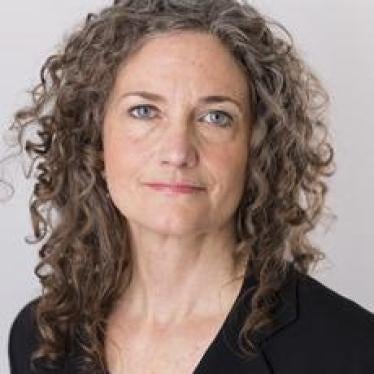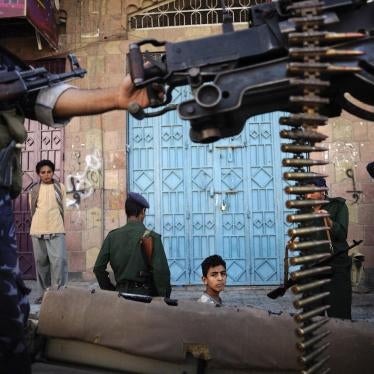When the Friends of Yemen group meets Wednesday in Riyadh, representatives from the US, the EU and Gulf states are likely to focus on this week’s suicide bombing in the Yemeni capital, Sanaa, that killed nearly 100 soldiers and shook the fledging transition government. But international attention should not only be focused on al Qaeda and its affiliates—the need to hold human rights violators to account and a deepening humanitarian crisis should also be high on their agenda.
Foreign donors have every reason to be concerned about Yemen-based Al Qaeda in the Arabian Peninsula (AQAP) and its offshoot Ansar al-Sharia, which claimed responsibility for Monday’s attack on a military parade rehearsal. AQAP tried this month to blow up a US-bound jetliner, in the third such attempt since 2009. Ansar al-Sharia controls cities and towns in southern Abyan province, where it has imposed a strict and often brutal interpretation of Islamic law. Both groups have survived repeated Yemeni military attacks and US drone strikes, which are likely to increase in response to Monday’s bombing.
What has received less international notice are attempts by entrenched interests to undermine the new Yemeni government, which has pledged to build a rights-respecting democracy. Former president Ali Abdullah Saleh, who formally ceded power in February after a yearlong uprising, has even gone so far in his attempts as to hold a meeting in the presidential palace, according to Western government officials. State security forces including the elite Republican Guards and the Central Security paramilitary unit, implicated in deadly attacks on protesters during last year’s unrest, are still controlled by Saleh’s close relatives, some of whom have brazenly resisted efforts by the transitional president, Abdu Rabu Mansour Hadi, to bring them under a unified civilian command.
Within hours of Monday’s bombing, Hadi ordered a security force shakeup, but not at the top level. Ammar Saleh, the former president’s nephew, was replaced as deputy of the National Security Bureau, a unit loyal to Saleh. Along with the Republican Guard and Central Security, the National Security Bureau has been implicated in abuses including unlawful detention and torture of opposition protesters during the uprising—and in some cases after Hadi became acting president. But Ammar held two positions in National Security and Hadi only named a replacement for one post.
Hadi also replaced the commander of the Central Security Forces, which includes a US-trained and funded counterterrorism unit—but he did not remove Saleh’s nephew Yahya Saleh as Central Security’s de-facto leader. Hadi’s previous efforts at sidelining Saleh’s relatives and loyalists succeeded only after repeated efforts and international pressure; he’s also had to coax errant commanders to dispatch scant reinforcements to battle Ansar al-Sharia in Abyan.
The Friends of Yemen, a group of 20 countries and intergovernmental institutions whose goal is to bring stability to the fractured Arabian country, can help Hadi’s new government do far more. The US set the right tone on May 15, when President Barack Obama authorized the Treasury Department to freeze the US assets of anyone who “obstructs” the political transition in Yemen. While the language was overly broad, the intent—to sanction spoilers such as Saleh and his loyalists—was on target.
The Friends should take that order one step further by pressing the United Nations Security Council, the EU and Gulf states to ban travel and freeze foreign assets of current and former officials considered most responsible for human rights crimes in Yemen until these abuses are halted, genuine steps are taken to investigate them, those responsible are held to account, and abusive commanders are removed from the security forces.
The Friends also should tie security assistance to government progress in reining in rogue security forces and investigating serious human rights violations during and after last year’s uprising. Yemen’s parliament granted Saleh and all officials who served with him sweeping immunity for crimes committed during his 33-year rule, but that doesn’t preclude other forms of accountability, such as prosecutions abroad or dismissals of abusive security force members.
In addition, Friends members should increase steps to stem Yemen’s mounting humanitarian crisis. Nearly 40 percent of the population—about 10 million people—lack regular access to food. Nearly 1 million young children suffer from malnutrition and a quarter of them may die if they do not if they do not quickly receive life-saving assistance, the UN says.
A half-million people are internally displacedfrom last year’s upheavals and previous conflicts, and the country has been flooded with more than 200,000 refugees from the Horn of Africa.
Left to fester, instability and hunger will only provide further openings for groups such as AQAP and Ansar al-Sharia to flourish in Yemen.
Letta Tayler is a Yemen and terrorism/counterterrorism researcher at Human Rights Watch.








